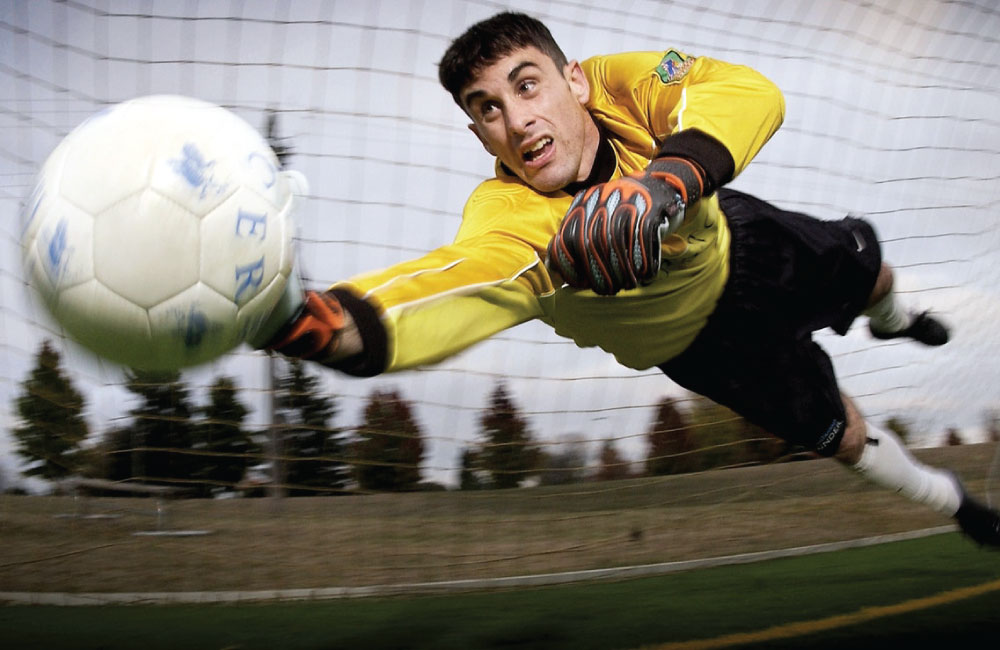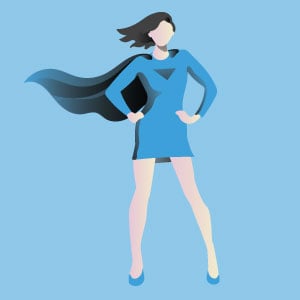The best contact lenses for sports are super important because a single moment of blurred vision can make the difference between winning or losing. Contact lenses are ideal for athletes because of the superior vision and the freedom from glasses on your face. Different athletes have different visual demands depending on their sport, so they will be looking for different things out of a contact lens.
For example, a middle-aged golfer might need a multifocal contact lens so they are able to see the distance greens and also up close at their card. A young runner with light blue eyes might be looking for a lens that darkens in direct sunlight, such as the Acuvue Oasys lens with Transitions. A swimmer will be needing a daily disposable lens to protect their eyes from the harmful chemicals in pool water and the risks of infection.
Below is a comprehensive review of the top contact lens types and brands for different types of athletes. Make sure you discuss your options with your eye doctor to figure out what lens is right for you. And as always, remember that you can use our contact price comparison page to see the prices that different sites sell the same lenses for!
Top 5 Contact Lenses for Athletes
These lenses are just some of my personal favorites from my own experience with contact lenses and sports. Make sure you consult your eye care provider to find the options that work best for you.
1. Dailies Total 1
I chose this lens because it is one of my favorite daily disposable options. This lens boasts good comfort and excellent vision. It is also available for patients who have astigmatism and those who are presbyopic!
Daily disposable lenses in general are a great option for athletes because of the convenience. If you only need a few sets of lenses for the one day a week that you play a sport and need to wear contacts vs. glasses, these are a great option that eliminates the need for storing / cleaning etc. Daily lenses are also great because if you play a sport where you sweat a lot or get dirt or dust in your eyes, these lenses can be easily disposed of after a game.

2. Acuvue Oasys 1 Day
This is another great disposable lens that has great comfort and vision and is available in toric options.
3. Bausch + Lomb Infuse Daily
Another great daily lens option that is also good for patients with dry eye symptoms. However, this lens is not yet available for astigmatism or presbyopia. See B+L Infuse vs. Acuvue Oasys!
4. Acuvue Oasys with Transitions
For those athletes participating in an outdoor sport where you cannot or do not want to wear sunglasses (soccer, tennis, running, etc) this is a great option to reduce sun glare.
5. Speciality Hard Contact Lenses
While the advances in soft contact lens technology has significantly improved over the past few years, some patients still might not be able to get the superior vision that they are looking for in soft lenses.
For example, for patients with high amounts of irregular astigmatism, soft lens options might be limited. For this reason, I think that specialty hard contact lens options like rigid gas permeable lenses, hybrid lenses, and scleral lenses are important options to consider.
These types of specialty contact lenses are more difficult for eye care providers to fit, might be more expensive, and might take longer to order and obtain. However, the visual benefits of these lenses often outweigh the negatives.
Talk to your eye doctor about all the different lens options available for your particular prescription and needs to see if maybe specialty hard lenses are right for you.
Best Contacts For Swimming and Water Sports – Always Wear Goggles
Swimming with contact lenses is a controversial topic for most eye doctors. The general “rule of thumb” is that lenses are not to be worn for any type of swimming/water activity because of the dangers of associated risks. In the real world, however, that can seem super unrealistic, so you’ll want to make sure you wear swimming goggles that prevent any water from coming in contact with your eye. See the best swim goggles for contact wearers.
Swimming with contact lenses can result in infections, irritation, and potentially sight-threatening conditions. The lenses can absorb or trap the water, allowing bacteria or protozoa to thrive in an opportunistic environment, and ultimately result in an infection. That is why most eye doctors strongly educate against wearing soft contact lenses in the shower, hot tubs, pools, or natural waters such as lakes, rivers, oceans, etc.
However, some exceptions can be made depending on the water activity involved. It is important to contact your eye doctor for their specific recommendation based on your water sport visual needs and ocular history.
Wearing Dailies Is Best
If you do prefer to wear contacts, many practitioners would prefer a patient to wear daily disposable lenses for water activities. While you still run the risk of infection by wearing the soft contact lenses in a water environment, there is less risk associated with daily disposable lenses that are thrown out directly after use in these situations.
If you are a patient that cannot wear contacts for water sports, there are additional options for seeing clearly for such activities. Talk to your doctor and see if they would be able to order you prescription sunglasses with a wrap-around band or goggles, depending on what sport you’re participating in.
Many serious water athletes also opt for refractive surgeries such as LASIK, LASEK, or PRK which can provide long-standing clear vision without glasses or contact lens correction. But these surgeries carry risks of their own.
Are Contacts With Transitions Good For Sports?
The Acuvue Oasys with Transitions lenses are a great option for patients who play outdoor sports. If you are light-sensitive or suffer from glare issues while participating in outdoor sports like running, golfing, tennis, skiing, etc., these lenses might be a good option for you!
These lenses are especially helpful to reduce the amount of sunlight entering your eyes for sports that you are not able to wear sunglasses or goggles for. For example, if you really want to have some sun glare reduction while you play tennis and don’t want to deal with sunglasses on your face while you play, these lenses might give you some beneficial relief from the sun.
Best Contacts For Sports with Astigmatism
Athletes who suffer from astigmatism might complain of blurred vision, especially at nighttime under stadium lights. Uncorrected astigmatism can result in blurred vision, glare, halos, smeared images, doubled images, etc. which can negatively affect your athletic performance.
Some popular contact lens brands that correct for astigmatism include Acuvue Oasys for Astigmatism, Biofinity Toric, and Air Optix plus Hydraglyde for Astigmatism.
For those athletes who would like the convenience of a daily lens option, there is the 1-Day Moist for Astigmatism, the Acuvue Oasys 1-Day for Astigmatism, and Dailies Aquacomfort Plus Toric.
Best Multifocal Contacts For Sports
Having presbyopia can make it difficult for athletes that are required to see things at various distances for their sport. For example, an umpire needs to be able to see at distance across the ball field, but also be able to see up close at home plate to make those tricky close calls. The same is true for a golfer who needs to see the pin from a long distance and then write in a scorecard or see the writing on a distance meter or scope.
One popular brand of multifocal lenses is the Air Optix plus HydraGlyde Multifocal. Another option that is great for patients who want a daily lens is the 1-Day Acuvue Moist Multifocal. And for those patients who also have to correct for an astigmatism, the Biofinity Toric Multifocal might be the best option.
As always, it is important to consult with your eye care provider in order to find the best multifocal lens brand that works for you. What works for one presbyopic patient might not work for another, as everyone has different visual needs and tolerances.
Which Contact Lenses Do Pro Athletes Wear?
Many professional athletes are just like regular people when it comes to their eyesight and vision. Only a very small percentage of the population is truly emmetropic – meaning that they have “perfect” vision and have no refractive error or prescription. That means most professional athletes actually do have a prescription, and they might wear glasses or contacts to help correct their vision.
One example of a top athlete that wears contact lenses is football / soccer star, Cristiano Ronaldo. By wearing contact lenses, Ronaldo is able to have sharp vision on the football field that isn’t limited by heavy, visual field-constricting glasses on his face.
Another famous athlete, Steph Curry, also wears contact lenses. Curry has a condition called keratoconus which means that the front surface of his eye, the cornea, is misshapen. In order to receive the sharpest vision possible, Curry likely wears a type of specialty contact lens that is called a scleral contact lens. These lenses vault over the misshapen cornea, and land on the white parts of the eyes – the sclera.
These lenses have to be specially fit and made specifically for each patient’s cornea, so they can’t be easily ordered online like other types of soft contact lenses.
At the end of the day, pro athletes are just like normal people who struggle with different types of eye conditions and diagnoses. The contact lenses they wear are no different from the ones that normal patients have access to. Their vision is no better than yours if you’re wearing a contact lens brand and prescription that is right for you!
Tips for Wearing Contact Lenses During Sports
If you are going to wear contact lenses while playing sports, it is important to be prepared. The last thing you would want is to be pulled out of a close game because your contact lens fell out and now you cannot see!
For this reason, it is important to ALWAYS bring extra contact lenses with you while participating in your sport. I would argue that most people, regardless of their athleticism, should always have an extra pair of lenses with them to prevent being stuck in a situation where you cannot see. This extra pair will also come in handy if you have a lost contact in your eye from getting hit.
Always keep an extra pair, or two, handy in your gym back, purse, locker, car, etc. You never know when or where you might be in a pinch and be needing that extra pair of contacts.
It’s also important to make sure that you have an extra solution and a case readily available as well in case you need to clean or store a lens. It also might be helpful to carry a couple vials of rewetting drops with your lenses, especially if you know you suffer from dry eye. If you play a sport outside in a windy environment, a cold environment, or if you don’t blink as often while focusing during your play time, your eyes might be more prone to drying out. Keeping some artificial tears / rewetting drops handy can help to solve any dry eye problems you might have during practice or competition.

Dr. Olivia Burger, O.D. is an optometrist who graduated from the Pennsylvania College of Optometry. She is pursuing a 1-year residency at the UC Berkeley School of Optometry in Vision Science in Primary Care / Contact Lens. Her optometric areas of interest include private practice, contact lenses, and optometric service organizations such as VOSH. In her free time, she enjoys live music and is a freelance concert photographer.